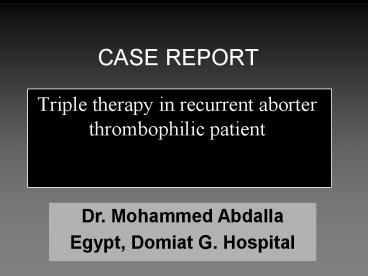CASE REPORT - PowerPoint PPT Presentation
1 / 22
Title:
CASE REPORT
Description:
... of thrombophilia as her father had recurrent episodes of ... till now he is on long term oral anticoagulant. her sister at that time was not married yet ... – PowerPoint PPT presentation
Number of Views:103
Avg rating:3.0/5.0
Title: CASE REPORT
1
CASE REPORT
- Triple therapy in recurrent aborter thrombophilic
patient
Dr. Mohammed Abdalla Egypt, Domiat G. Hospital
2
10 Abortions ,10 DVTs the 11th,12th Pregnancies
Were Full Term
3
- Mrs. S. aged 29 years married 6 years ago with no
living children . - When I examined her for the first time she had
been experienced recurrent 10 abortions non
exceeded 20 wk. gestation .BUT all of them were
associated with femoral or iliac vein thrombosis
.
the symptoms of DVT appear as early as 4 wk.
Gestation, they looked like a diagnostic symptom
of pregnancy.
4
- The case was diagnosed as primary anti
phospholipid syndrome
( had a positive lupus anticoagulant test,
positive for anticardiolipin and prolonged
activated partial thromboplastin time (APTT) ).
APTT is an adequate screening test for lupus-like
anticoagulant antibodies (prolonged)
Protein c and protein s were not investigated.
5
- The family history was highly suggestive of
thrombophilia as her father had recurrent
episodes of DVT, and an episode of pulmonary
embolism . till now he is on long term oral
anticoagulant.
her sister at that time was not married yet (
but later when she conceived she developed DVT. )
she is also my patient.
6
- Low dose aspirin and 5000u /12 h sc.
Unfractionated heparin was the prophylactic
regimen once she got pregnant in most of previous
pregnancies.
but unfortunately it did not guard against the
occurrence of DVT and fetal death .
7
- According to that frightening history she was
advised never to get pregnant again. But she
visited my clinic insisting to try another
pregnancy risk.
(by her own words I want to be mother even for
one day).
8
- After proper counseling I advised ..
TRIPLE daily THERAPY once serum HCG get ve at 25
th . day cycle.
- low dose aspirin
- 20,000 u unfractionated heparin on three doses sc
- 30mg Prednisone on three doses/ calcium and iron
preparations Rx were provided..
NB. LMWH was excluded for financial causes.
9
Follow up
APTT
- was done weekly for the first month and monthly
for the rest of pregnancy. To be kept within the
lower limit of the target therapeutic range
10
Follow up
Platelet count
- was assessed at the first week of therapy then
every two months
11
Follow up
Glucose tolerance test
- was done at 10 wk. And 28 wk
12
Follow up
Routine antenatal visits
- Every two weeks assessing BP, HB, urine testing,
wt. Gain. AND dose adjustment which was not
needed.
13
Follow up
Ultrasonographic assessment
- At 10 wk 20 32wk revealed normal progressive
growth, no congenital - Anomalies , and good biophysical
- Profile
14
Follow up
- Superficial phlebothrombosis was marked all over
the lower abdomen, flanks and lower limbs.
15
Labour
- At 37 wk. PROM occurred, so I stopped heparin and
aspirin and CS was done after 12 hours. - The fetus weighed 2,500 grams with good apgar
scoor at 1 and 5 minutes .the placenta was of
average wt. With multiple infarcts.
16
Labour
- 12 hours post partum heparinisation was resumed
in a prophylactic dose (5000u/12h) sc. With
warfarin , after 5 days heparin was stopped and
warfarin(5 mg/day ) continued . corticosteroid
had been gradually withdrown over three weeks.
17
After 2 Years
- In spit of strict instructions of injectable
contraceptive use ,she got pregnant again because
she stopped contraception . - The same protocol was applied again and an
elective CS was done at 38 wk on a single viable
fetus. - She refused tubal ligation.
18
comment
- The immune system works by identifying proteins
as normal or foreign - Autoimmune response represents the immunologic
response of the mother to a pregnancy (woman is
rejecting her own proteins)
19
comment
- There are four different autoimmune problems that
can cause recurrent abortion - Antiphospholipid antibodies
- antithyroid antibodies
- Antinuclear antibodies
- Lupus-like anticoagulant
20
comment
- The antibodies themselves do not cause
miscarriage, but their presence indicates that an
abnormal autoimmune process will likely interrupt
the ability of the phospholipids to do their job,
putting the woman at risk for miscarriage, second
trimester loss, intrauterine growth retardation
(IUGR) and pre-eclampsia.
21
comment
- Heparin is administered to combat possible
clotting problems. - Prednisone is given to decrease autoantibody
levels, provide blood-thinning and
anti-inflammatory reactions, and reduce the risk
of clotting. - low dose Aspirin is a prostaglandin inhibitor
which decreases agglutination of the platelets
(clotting), and has some anti-inflammatory
action.
22
- Thank you
Dr. Mohammed Abdalla Egypt, Domiat general
hospital































